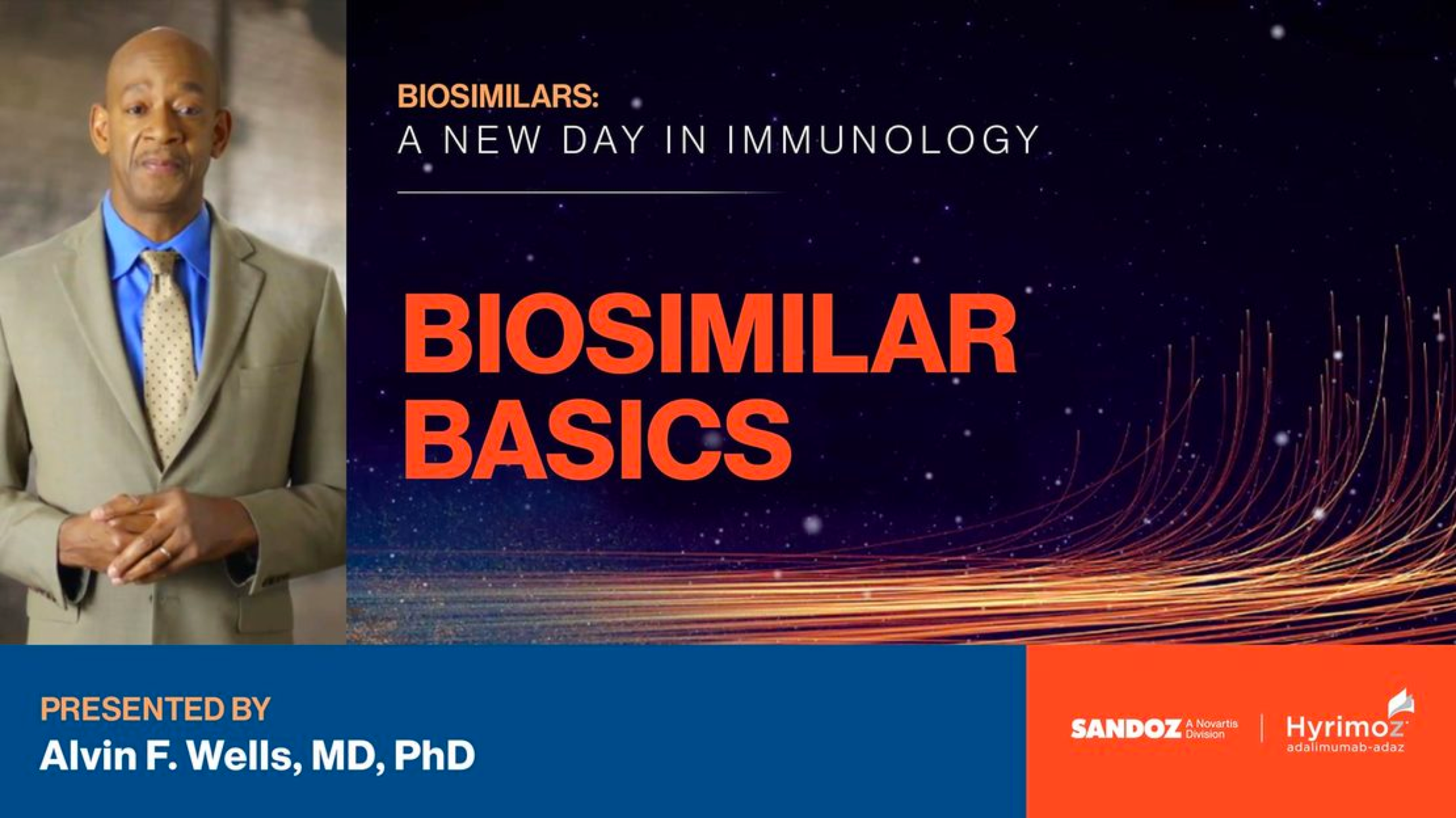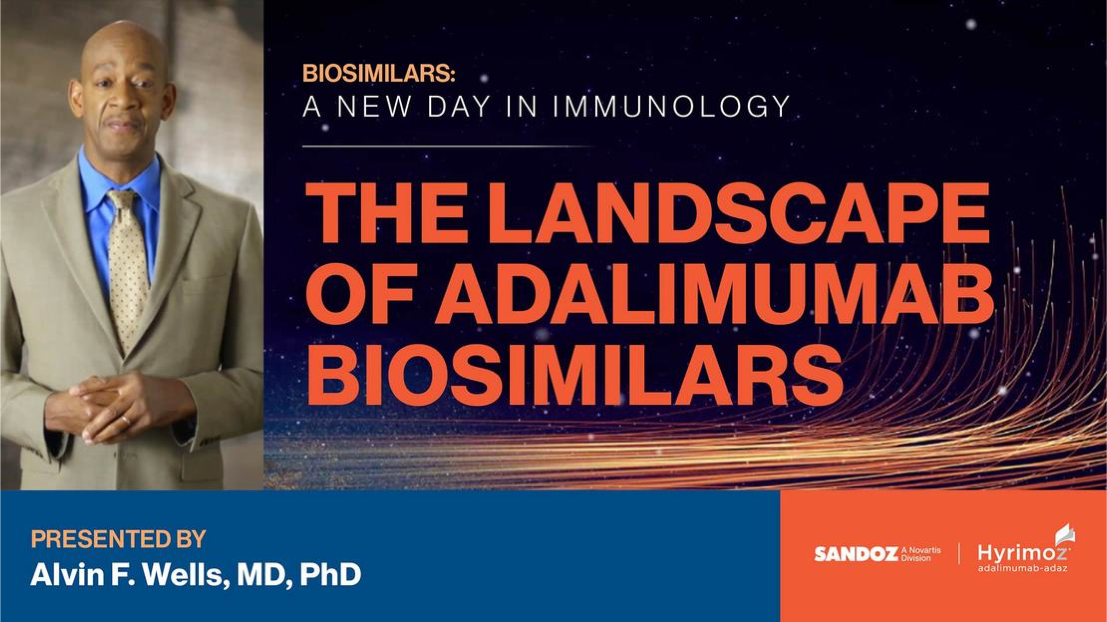Downloadable materials for you, your patients, and your staff
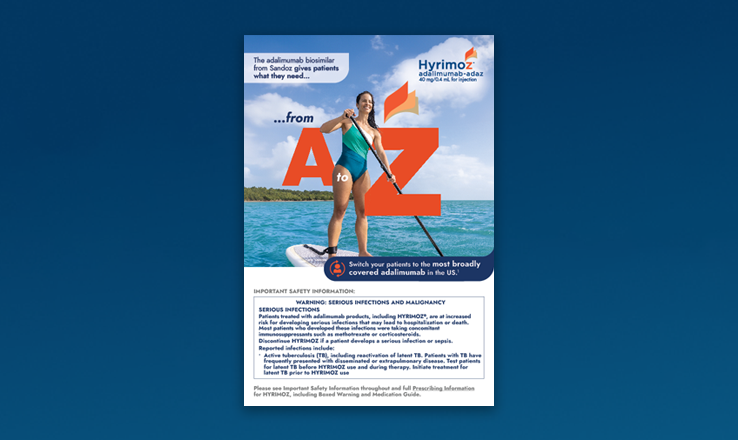
Information for providers
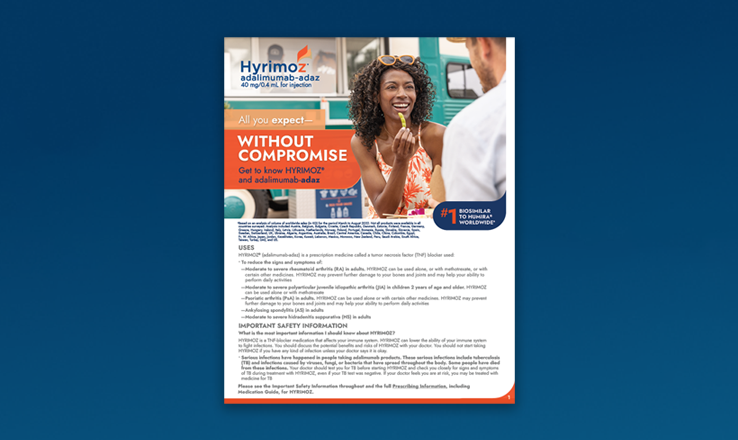
Information for patients

Office Guide
Frequently Asked Questions

A biosimilar is an FDA-approved biologic product that is highly similar to and has no clinically meaningful differences from an existing FDA-approved product, called the reference product. Biosimilars are highly similar, but not identical, to their reference biologics. To be approved by the FDA, biosimilars undergo a robust evaluation process to prove that they demonstrate equivalent safety, efficacy, and quality to the reference product.1

While biologics have transformed the lives of millions of people suffering from disabling conditions, they come with a high price tag. Biosimilars however, can provide the same efficacy and safety patients need, with a lower price point. This allows for expanded patient access and ultimately drives innovation.2,3
Presribing biosimilars has resulted in:
- $36 billion in savings since 20153
- $12.4 billion in savings in 2023 alone3
- 495M additional patient days of treatment3
- ~45% lower out of pocket costs for patients who used certain biosimilars instead of reference products4

Adalimumab-adaz is a biosimilar to Humira® (adalimumab). Sandoz offers 2 presentations of our adalimumab biosimilar: adalimuab-adaz and HYRIMOZ. It is important to know that adalimumab-adaz and HYRIMOZ are the same medicine. Offering 2 presentations ensures broader access for your patients.
Adalimumab-adaz has been approved and available for use outside the United States since 2018. Two Phase 3 confirmatory switch studies showed that patients can expect consistent safety and efficacy results when switching from Humira® to adalimumab-adaz. Additionally, adalimumab-adaz was examined in several real-world studiesa across multiple indications. Adalimumab-adaz has the same high-concentration, citrate-free formulation as Humira® and is indicated to treat rheumatoid arthritis, juvenile idiopathic arthritis, psoriatic arthritis, ankylosing spondylitis, Crohn's disease, ulcerative colitis, plaque psoriasis, hidradenitis suppurativa, and uveitis. It is administered using either a Sensoready® pen autoinjector or a prefilled syringe.5-12
Please see full Indications below.
aThis analysis was not prespecified and not powered to detect a statistically significant difference. Results should be considered for descriptive purposes only. The study was not designed to provide comparative efficacy data and should not be interpreted as providing evidence of either superiority or noninferiority of adalimumab-adaz.

Sandoz has not conducted any head-to-head studies between adalimumab-adaz and other adalimumab biosimilars. However, biosimilar adalimumab-adaz offers the same features that your patients have come to expect with Humira®.
- It has the same high-concentration, citrate-free formulation as Humira® 5,12
- Adalimumab-adaz is administered using the Sensoready pen, which is designed with patients in mind with features they will see, hear, and feel
- Sandoz One Source provides comprehensive services and support to both patients and office staff

Biosimilars such as adalimumab-adaz go through a rigorous evaluation and approval process to show that they are highly similar to and have no clinically meaningful differences from their reference product when it comes to quality, safety, and efficacy. Two Phase 3 confirmatory switch studies showed that patients can expect consistent safety and efficacy results when switching from Humira® to biosimilar adalimumab-adaz. Real-world studiesa showed that the vast majority of patients who were switched to adalimumab-adaz stayed on treatment long term. Patients can expect the same results with adalimumab-adaz as they currently experience with Humira®.1,5-11
aThis analysis was not prespecified and not powered to detect a statistically significant difference. Results should be considered for descriptive purposes only. The study was not designed to provide comparative efficacy data and should not be interpreted as providing evidence of either superiority or noninferiority of adalimumab-adaz.

You can expect the same results with biosimilar adalimumab-adaz as your patients currently experience with Humira®. Adalimumab-adaz has been approved and available for use in the EU since 2018. Two Phase 3 confirmatory switch studies showed that patients can expect consistent safety and efficacy results when switching from Humira® to adalimumab-adaz. Additionally, adalimumab-adaz was examined in several real-world studiesa across multiple indications.5-11
aThis analysis was not prespecified and not powered to detect a statistically significant difference. Results should be considered for descriptive purposes only. The study was not designed to provide comparative efficacy data and should not be interpreted as providing evidence of either superiority or noninferiority of adalimumab-adaz.

Extrapolation is when a biosimilar is approved for an indication that it was not directly studied in. If the totality of evidence demonstrates biosimilarity to the reference biologic in 1 indication, the manufacturer may apply for the approval of other indications. To do so, the manufacturer works with the FDA to determine what data are needed to support extrapolations. Typically, manufacturers must provide scientific justification, which includes knowledge about the MOA, PK, PD, efficacy, safety, and immunogenicity of the reference biologic in each of its approved indications. The practice of extrapolation is critical for biosimilars since, unlike reference biologics, biosimilars are developed and approved through an abbreviated pathway, which is what makes them potentially cost less and be more accessible.1
Two Phase 3 confirmatory switch studies showed that patients can expect consistent safety and efficacy results when switching from Humira® to biosimilar adalimumab-adaz. Additionally, adalimumab-adaz was examined in several real-world evidence studiesa across multiple indications.5-11
aThis analysis was not prespecified and not powered to detect a statistically significant difference. Results should be considered for descriptive purposes only. The study was not designed to provide comparative efficacy data and should not be interpreted as providing evidence of either superiority or noninferiority of adalimumab-adaz.
MOA=mechanism of action; PD=pharmacodynamics; PK=pharmacokinetics.

Adalimumab-adaz provides everything you and your patients have come to expect from adalimumab in terms of efficacy, safety, and patient support.
Adalimumab-adaz offers5-11,13:
- Robust real-world evidence: Adalimumab-adaz has been used in the EU since 2018, and multiple real-world studies showed that the vast majority of patients who were switched to adalimumab-adaz stayed on treatment long terma
- Features: The Sensoready pen has helpful features that patients can see, hear, and feel. Patients may benefit from switching to a device that has attributes such as buttonless activation and an ergonomic triangular shape
- Support: Sandoz One Source provides robust support when switching patients to adalimumab-adaz, so both patients and office staff can expect a seamless transition
- Biosimilar experience: Sandoz has been an industry leader in biosimilar manufacturing for over 25 years
aThis analysis was not prespecified and not powered to detect a statistically significant difference. Results should be considered for descriptive purposes only. The study was not designed to provide comparative efficacy data and should not be interpreted as providing evidence of either superiority or noninferiority of adalimumab-adaz.

Yes. HYRIMOZ and adalimumab-adaz are the same medication, and patients prescribed either presentation have the same access to Sandoz One Source support services. This includes the Co-Pay program, 1:1 injection training, access to Nurse Ambassadors, sharps containers, refill reminders, and more.

Sandoz is pleased to offer financial support for patients who are prescribed adalimumab-adaz. Adalimumb-adaz has a Co-Pay program, and eligible patientsb may pay as little as a $0 per treatment. A Patient Assistance Program is also available for uninsured/underinsured patients.

There will likely be a choice between at least 2 adalimumab biosimilars covered by a patient's insurance. There are a number of important factors to consider when making your choice, because not every biosimilar offers the same features that patients have come to expect with Humira®. Adalimumab-adaz does. In fact, adalimumab-adaz offers5-11,13:
- Robust real-world evidence: Adalimumab-adaz has been used in the EU since 2018, and multiple real-world studies showed that the vast majority of patients who were switched to adalimumab-adaz stayed on treatment long terma
- Features: The Sensoready pen has helpful features that you can see, hear, and feel. Patients may benefit from switching to a device that has attributes such as buttonless activation and an ergonomic triangular shape
- Support: Sandoz One Source provides robust support when switching patients to adalimumab-adaz, so both patients and office staff can expect a seamless transition
- Biosimilar experience: Sandoz has been an industry leader in biosimilar manufacturing for over 25 years
aThis analysis was not prespecified and not powered to detect a statistically significant difference. Results should be considered for descriptive purposes only. The study was not designed to provide comparative efficacy data and should not be interpreted as providing evidence of either superiority or noninferiority of adalimumab-adaz.

Sandoz HYRIMOZ Co-Pay Terms and Conditions: Limitations apply. Valid only for patients with private insurance and where not prohibited by law. Prescription must be for an approved indication. Program is subject to an annual limit, and the patient is responsible for any costs once limit is reached in a calendar year.
Program not valid (i) under Medicare, Medicaid, TRICARE, VA, DoD, or any other federal or state health care program, (ii) where patient is not using insurance coverage at all, (iii) where the patient's insurance plan reimburses for the entire cost of the drug, or (iv) where product is not covered by patient's insurance. The value of this program is exclusively for the benefit of patients and is intended to be credited towards patient out-of-pocket obligations and maximums, including applicable co-payments, coinsurance, and deductibles. Patient may not seek reimbursement for the value received from this program from other parties, including any health insurance program or plan, flexible spending account, or health care savings account. Patient is responsible for complying with any applicable limitations and requirements of their health plan related to the use of the Program. Valid only in the United States and US Territories (Puerto Rico, American Samoa, Guam, Northern Mariana Islands, and US Virgin Islands). This Program is not health insurance, and may not be combined with any third-party rebate, coupon, or oer. Proof of purchase may be required. Sandoz reserves the right to rescind, revoke, or amend the Program and discontinue support at any time without notice.
Cordavis HYRIMOZ Co-Pay Terms and Conditions: Limitations apply. Valid only for those with private insurance. Prescription must be for an approved indication. Patient is responsible for any costs once limit is reached in a calendar year. Program not valid (i) under Medicare, Medicaid, TRICARE, VA, DoD, or any other federal or state health care program, (ii) where patient is not using insurance coverage at all, (iii) where the patient's insurance plan reimburses for the entire cost of the drug, or (iv) where product is not covered by patient's insurance. The value of this program is exclusively for the benefit of patients and is intended to be credited towards patient out-of-pocket obligations and maximums, including applicable co-payments, coinsurance, and deductibles.
The HYRIMOZ® Co-pay Terms and Conditions have restrictions when insurance entities limit what can be counted towards your deductible or other costs you bear when buying your medication. The most common names are “co-pay accumulator” or “co-pay maximizer” programs. These programs may be implemented without your awareness. In some cases, there may be a negative financial impact. The use of “co-pay accumulator” or “co-pay maximizer” programs by your insurer or health plan will limit your program benefits. These limits can be modified without prior notice. Cordavis reserves the right to audit and investigate any suspected violation of these terms and conditions. Cordavis also has the right to modify these terms and conditions at any time without prior notice. Program is not valid where prohibited by law. Patient may not seek reimbursement for the value received from this Program from other parties, including any health insurance program or plan, flexible spending account, or health care savings account. Patient is responsible for complying with any applicable limitations and requirements of their health plan related to the use of the Program. Valid only in the United States and U.S. Territories (Puerto Rico, Guam, Northern Mariana Islands, and Virgin Islands). This Program is not health insurance. Program may not be combined with any third-party rebate, coupon, or offer. Proof of purchase may be required. Cordavis reserves the right to rescind, revoke, or amend the Program and discontinue support at any time without notice.
What is a biosimilar?
A biosimilar is a biologic product that is highly similar to and has no clinically meaningful differences from an existing FDA-approved product, called the reference product. Biosimilars must undergo rigorous FDA evaluation to prove that they meet the same standards as their reference product in terms of quality, efficacy, safety, and immunogenicity.1
Biosimilar basics
Watch this video to hear Dr Wells, a rheumatologist, give an overview of biosimilars and outline the opportunities they represent to healthcare practitioners and patients.
Biosimilars are an innovation in healthcare
Not only are biosimilars as safe and efficacious as their reference product, they can also provide significant savings. Increasing the number of available biosimilars can:
- Improve patient access to biologic medicines such as adalimumab2
- Free up resources for investments in new medications and treatments3
- Drive competition within an unchallenged market3


The landscape of adalimumab biosimilars
In this video, Dr Wells discusses how increasing the number of available biosimilars can help increase patient access to biologic medicines like adalimumab.
The FDA approval process for biosimilars
When considering biosimilar products for approval, the FDA reviews the totality of evidence presented by the manufacturer. Biosimilars such as adalimumab-adaz must go through an extensive evaluation and approval process to prove that they are highly similar to and have no clinically meaningful differences from their reference product in terms of quality, efficacy, and safety.1
Guidelines for biosimilar approval
Watch Dr Cohen, a gastroenterologist, talk about the FDA approval pathway for biosimilars and the stringent guidelines that ensure they work as expected.

The Sandoz story
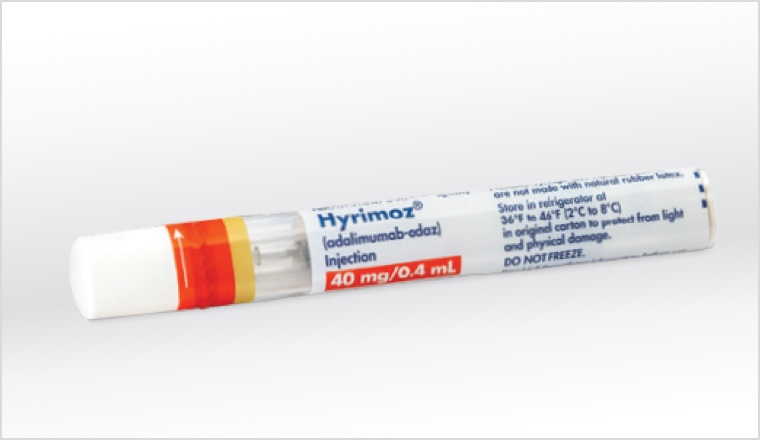
The Sensoready® pen
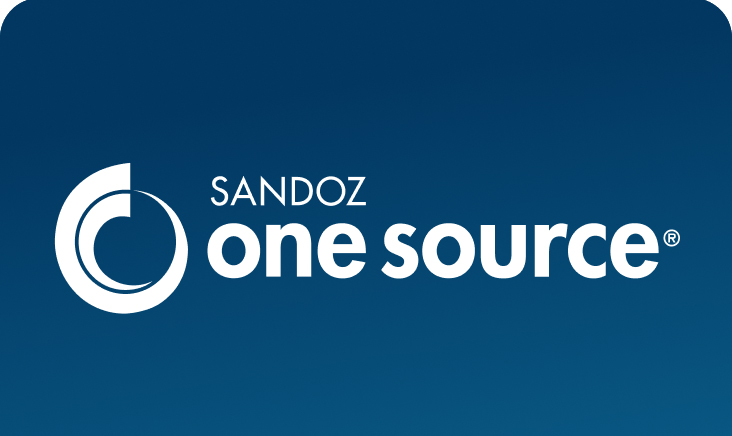
Sandoz One Source
INDICATIONS: HYRIMOZ® (adalimumab-adaz) injection for subcutaneous use, a prescription medication, is a tumor necrosis factor (TNF)-blocker indicated for:
- Rheumatoid Arthritis (RA): Alone or in combination with methotrexate or other non-biologic disease-modifying anti-rheumatic drugs (DMARDs), for reducing signs and symptoms, inducing major clinical response, inhibiting the progression of structural damage, and improving physical function in adult patients with moderately to severely active RA
- Juvenile Idiopathic Arthritis (JIA): Alone or in combination with methotrexate for reducing signs and symptoms of moderately to severely active polyarticular JIA in patients 2 years of age and older
- Psoriatic Arthritis (PsA): Alone or in combination with non-biologic DMARDs, for reducing signs and symptoms, inhibiting the progression of structural damage, and improving physical function in adult patients with active PsA
- Ankylosing Spondylitis (AS): Reducing signs and symptoms in adult patients with active AS
- Crohn’s Disease (CD): Treatment of moderately to severely active CD in adults and pediatric patients 6 years of age and older
- Ulcerative Colitis (UC): Treatment of moderately to severely active UC in adult patients
Limitations of use: The effectiveness of adalimumab products has not been established in patients who have lost response to or were intolerant to TNF blockers. - Plaque Psoriasis (Ps): Treatment of adult patients with moderate to severe chronic Ps who are candidates for systemic therapy or phototherapy, and when other systemic therapies are medically less appropriate. HYRIMOZ should only be administered to patients who will be closely monitored and have regular follow-up visits with a physician
- Hidradenitis Suppurativa (HS): Treatment of moderate to severe HS in adult patients
- Uveitis: Treatment of non-infectious intermediate, posterior, and panuveitis in adult patients
IMPORTANT SAFETY INFORMATION:
WARNING: SERIOUS INFECTIONS and MALIGNANCY
SERIOUS INFECTIONS
Patients treated with adalimumab products, including HYRIMOZ, are at increased risk for developing serious infections that may lead to hospitalization or death. Most patients who developed these infections were taking concomitant immunosuppressants such as methotrexate or corticosteroids.
Discontinue HYRIMOZ if a patient develops a serious infection or sepsis.
Reported infections include:
- Active tuberculosis (TB), including reactivation of latent TB. Patients with TB have frequently presented with disseminated or extrapulmonary disease. Test patients for latent TB before HYRIMOZ use and during therapy. Initiate treatment for latent TB prior to HYRIMOZ use
- Invasive fungal infections, including histoplasmosis, coccidioidomycosis, candidiasis, aspergillosis, blastomycosis, and pneumocystosis. Patients with histoplasmosis or other invasive fungal infections may present with disseminated, rather than localized, disease. Antigen and antibody testing for histoplasmosis may be negative in some patients with active infection. Consider empiric anti-fungal therapy in patients at risk for invasive fungal infections who develop severe systemic illness
- Bacterial, viral, and other infections due to opportunistic pathogens, including Legionella and Listeria
Carefully consider the risks and benefits of treatment with HYRIMOZ prior to initiating therapy in patients with chronic or recurrent infection.
Monitor patients closely for the development of signs and symptoms of infection during and after treatment with HYRIMOZ, including the possible development of TB in patients who tested negative for latent TB infection prior to initiating therapy.
MALIGNANCY
Lymphoma and other malignancies, some fatal, have been reported in children and adolescent patients treated with TNF blockers including adalimumab products. Post-marketing cases of hepatosplenic T-cell lymphoma (HSTCL), a rare type of T-cell lymphoma, have been reported in patients treated with TNF-blockers including adalimumab products. These cases have had a very aggressive disease course and have been fatal. The majority of reported TNF blocker cases have occurred in patients with Crohn's disease or ulcerative colitis and the majority were in adolescent and young adult males. Almost all these patients had received treatment with azathioprine or 6-mercaptopurine (6–MP) concomitantly with a TNF blocker at or prior to diagnosis. It is uncertain whether the occurrence of HSTCL is related to use of a TNF blocker or a TNF blocker in combination with these other immunosuppressants.
WARNINGS AND PRECAUTIONS
Serious Infections
- Do not start HYRIMOZ during an active infection, including localized infections
- If an infection develops, monitor carefully, and stop HYRIMOZ if infection becomes serious. Drug interactions with biologic products: A higher rate of serious infections has been observed in RA patients treated with rituximab who received subsequent treatment with a TNF blocker. An increased risk of serious infections has been seen with the combination of TNF blockers with anakinra or abatacept, with no demonstrated added benefit in patients with RA. Concomitant administration of HYRIMOZ with other biologic DMARDs (eg, anakinra or abatacept) or other TNF blockers is not recommended based on the possible increased risk for infections and other potential pharmacological interactions
- Patients 65 years of age and older, patients with co-morbid conditions and/or patients taking concomitant immunosuppressants may be at greater risk of infection
- Invasive fungal infections: For patients who develop a systemic illness on HYRIMOZ, consider empiric antifungal therapy for those who reside or travel to regions where mycoses are endemic
Malignancies
- In clinical trials, incidence of malignancies was greater in adalimumab-treated patients than in controls
- Consider the risks and benefits of TNF blocker-treatment, including HYRIMOZ, prior to initiating therapy in patients with known malignancy
- Non-melanoma skin cancer (NMSC) was reported during clinical trials for adalimumab-treated patients. Examine all patients, particularly those with a history of prolonged immunosuppressant or PUVA therapy for the presence of NMSC prior to and during treatment with HYRIMOZ
- In the adalimumab clinical trials there was an approximate 3-fold higher rate of lymphoma than expected in the general US population. Patients with chronic inflammatory diseases, particularly those with highly active disease and/or chronic exposure to immunosuppressant therapies, may be at a higher risk than the general population for the development of lymphoma, even in the absence of TNF blockers
- Post-marketing cases of acute and chronic leukemia have been reported in association with TNF-blocker use. Approximately half of the post-marketing cases of malignancies in children, adolescents, and young adults receiving TNF blockers were lymphomas; other cases represented a variety of different malignancies and included rare malignancies usually associated with immunosuppression and malignancies that are not usually observed in children and adolescents
Hypersensitivity Reactions
- Anaphylaxis or serious allergic reactions have been reported following administration of adalimumab products. If an anaphylactic or other serious hypersensitivity reaction occurs, immediately discontinue administration of HYRIMOZ and institute appropriate therapy
Hepatitis B Virus Reactivation
- Use of TNF blockers, including HYRIMOZ, may increase the risk of reactivation of hepatitis B virus (HBV) in patients who are chronic carriers. Some cases have been fatal
- Evaluate patients at risk for HBV infection for prior evidence of HBV infection before initiating TNF blocker therapy
- Exercise caution in patients identified as carriers of HBV and closely monitor during and after HYRIMOZ treatment
- In patients who develop HBV reactivation, stop HYRIMOZ and initiate effective anti-viral therapy. Exercise caution when resuming HYRIMOZ after HBV treatment
Neurologic Reactions
- Use of TNF-blocking agents, including adalimumab products, has been associated with rare cases of new onset or exacerbation of central nervous system and peripheral demyelinating disease, including multiple sclerosis (MS), optic neuritis, and Guillain-Barré syndrome
- Exercise caution when considering HYRIMOZ for patients with these disorders; discontinuation of HYRIMOZ should be considered if any of these disorders develop
- There is a known association between intermediate uveitis and central demyelinating disorders
Hematological Reactions
- Rare reports of pancytopenia, including aplastic anemia, have been reported with TNF-blocking agents. Medically significant cytopenia has been infrequently reported with adalimumab products
- Consider stopping HYRIMOZ if significant hematologic abnormalities occur
Heart Failure
- Worsening and new onset congestive heart failure (CHF) has been reported with TNF blockers. Cases of worsening CHF have also been observed with adalimumab products; exercise caution and monitor carefully
Autoimmunity
- Treatment with adalimumab products may result in the formation of autoantibodies and, rarely, in the development of a lupus-like syndrome. Discontinue treatment if symptoms of a lupus-like syndrome develop
Immunizations
- Patients on HYRIMOZ should not receive live vaccines
- Pediatric patients, if possible, should be brought up to date with all immunizations prior to initiating HYRIMOZ therapy
- Adalimumab is actively transferred across the placenta during the third trimester of pregnancy and may affect immune response in the in utero exposed infant. The safety of administering live or live-attenuated vaccines in infants exposed to adalimumab products in utero is unknown. Risks and benefits should be considered prior to vaccinating (live or live-attenuated) exposed infants
ADVERSE REACTIONS
The most common adverse reactions (incidence >10%): infections (eg, upper respiratory, sinusitis), injection site reactions, headache, and rash.
Please see full Prescribing Information for HYRIMOZ, including Boxed Warning and Medication Guide.
To report SUSPECTED ADVERSE REACTIONS, contact Sandoz Inc. at 1-800-525-8747 or FDA at 1-800-FDA-1088 or www.fda.gov/medwatch.




